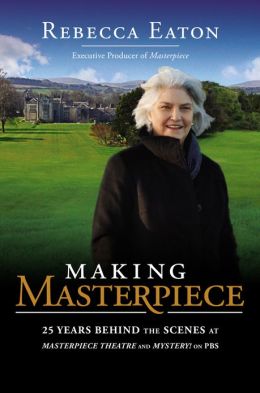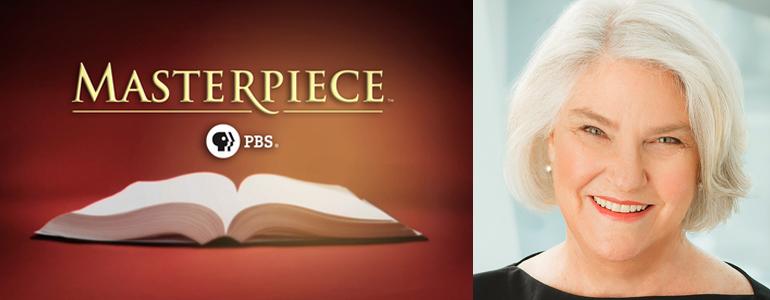
Whenever I pick up a history, memoir or biography, the first thing I do is look at the pictures. Naturally, that's what I did when I got home from the library with Making Masterpiece. I was puzzled, because the first photos in the book are of the author as a young girl. I thought this was a book about producing PBS's Masterpiece Theatre and Mystery! series, not about the author's life. It turns out that it's both and it also turns out that's mostly a good thing.
Eaton, born in 1947, was a Vassar student when a school apprenticeship program allowed her to intern at the BBC and get her introduction to media production. Returning home to Boston, she got a job at WGBH (jokingly referred to when I was growing up as God Bless Harvard), which we now know as one of PBS's flagship stations and original home to Julia Child's The French Chef and This Old House, among many others.
 |
| Who knew Julia Child had so much company on TV? |
 |
| Mrs. Bridges and Mr. Hudson in Upstairs Downstairs |
 |
| Alistair Cooke hosting Masterpiece Theatre |
daunting assignment for Eaton, who hadn't ever understood the appeal of mysteries, who had just discovered she and relatively new husband Paul were expecting a baby, and who felt she didn't have nearly enough experience to take over from Wilson.
Executive positions in television weren't all that common for women in the early 1970s, and starting the job when pregnant was a real anomaly––Eaton followed convention and didn't tell any of the BBC and other television contacts in England about her condition, even when morning sickness forced her to flee meetings abruptly.
Eaton is very frank about her failures, like having to be talked into Prime Suspect, with Helen Mirren, and turning down the Colin Firth Pride & Prejudice miniseries because Masterpiece Theatre had shown a version years earlier. She even discloses that she had a run-in with contacts at Mobil about editorial influence, and Mobil insisted that PBS fire her. She wasn't fired, but she was put on probation and told she very much needed to work on her people skills. I don't think I'd want to confess something like that, so I had to admire Eaton's openness.
 |
| Helen Mirren in Prime Suspect |
"But what about the shows and the actors?" I hear you wondering. The book doesn't disappoint there. Eaton breezily recounts story after story about Helen Mirren, Diana Rigg, Kenneth Branagh, Paul Newman, Robert Redford, Princess Margaret (a big fan of Inspector Morse), Daniel Radcliffe, and the entire Downton Abbey cast.
Eaton has such an enormous respect for British actors; their devotion to the work, flexibility and lack of star attitude. She tells a particularly memorable story about Diana Rigg soldiering on without a word of complaint, though her husband had only just deserted her, at age 52 and with a 12-year-old daughter at home, for 20-something Joely Richardson. (Man, that British actor community is a small world! That 12-year-old daughter, Rachael Stirling, is now an actress who was recently featured in The Bletchley Circle––which was shown on PBS, by the way. And Joely Richardson, daughter of the famed Vanessa Redgrave, went on to marry producer Tim Bevan (Love, Actually), who dumped her for a younger woman. Their daughter, Daisy Bevan, is––not surprisingly––also an actress.)
 |
| Diana Rigg hosting Mystery! |
 |
| Martin Freeman and Benedict Cumberbatch in Sherlock |
While it wasn't quite what I expected, Making Masterpiece ends up being a fascinating story of how Masterpiece (with what is now called three subdivisions: Classic, Contemporary and Mystery) is produced, filled with yummy gossipy bits about actors we're all familiar with, and a clear-eyed confession of the personal costs to a woman of having a demanding job over the last quarter century.
 |
| Laurence Fox, the next Lord Peter? |
Note: Versions of this review may appear on Amazon, goodreads and other review sites under my usernames there.

Yes! Fox as Lord Peter! But who as H. Vane?
ReplyDeleteEnjoyed your review
Jane
Jane, you can't imagine how many hours I've wasted trying to cast Harriet Vane in my head! Once upon a time, I was sure Gina McKee would be perfect. (She played Irene in the remake of the Forsyte Saga miniseries.) But the years have gone by and that ship has sailed.
ReplyDeleteEmily Blunt might be good, or Rachael Stirling (mentioned above), who was in The Bletchley Circle. But you know those Brits. There are always so many wonderful actors there who don't look like they came from a Barbie doll factory. I would trust the BBC or ITV to get it right.